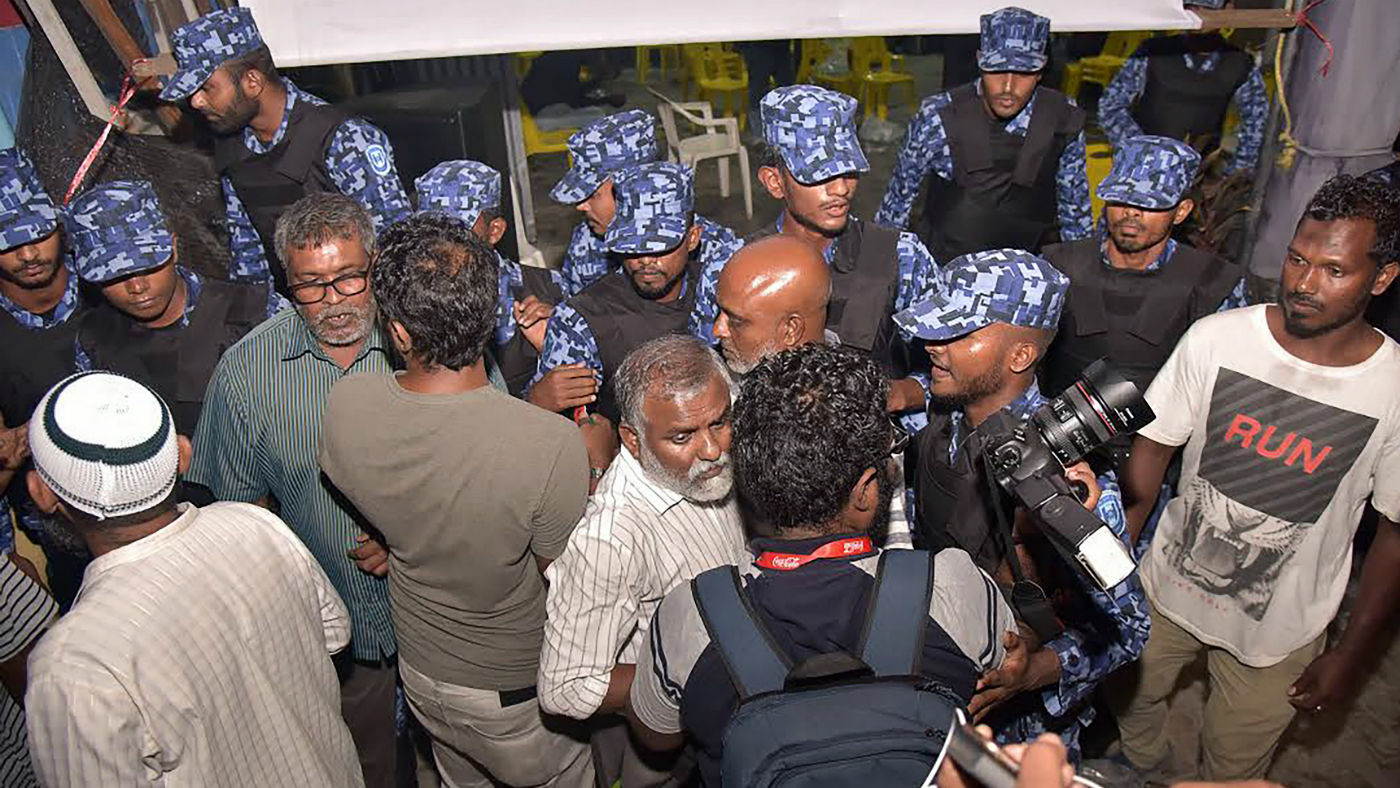Maldives declares ‘state of emergency’ over political detainees
Ex-president calls for US intervention as political crisis threatens Indian Ocean island chain

A free daily email with the biggest news stories of the day – and the best features from TheWeek.com
You are now subscribed
Your newsletter sign-up was successful
The Maldives’ President Abdulla Yameen yesterday declared a 15-day state of emergency in the Indian Ocean nation amid an escalating political crisis over his regime’s detention of political opponents and top judges.
Troops in riot gear surrounded the Maldives Supreme Court, in capital Male, at dawn today and arrested two judges including Chief Justice Abdulla Saeed, reports South African broadcaster SABC News. Hours earlier police had arrested former president and opposition leader Maumoon Abdul Gayoom - Yameen’s estranged half-brother - at his home in the city, says Time magazine.
The arrests came after the Supreme Court dismissed terrorism convictions against jailed political opponents of Yameen, and quashed the conviction of former president Mohamed Nasheed, the Maldives’ first democratically elected leader. Nasheed lives in exile in Britain, Reuters says.
The Week
Escape your echo chamber. Get the facts behind the news, plus analysis from multiple perspectives.

Sign up for The Week's Free Newsletters
From our morning news briefing to a weekly Good News Newsletter, get the best of The Week delivered directly to your inbox.
From our morning news briefing to a weekly Good News Newsletter, get the best of The Week delivered directly to your inbox.
According to the Financial Times, the Supreme Court’s ruling “paved the way for the exiled opposition leader’s return to the Maldives to contest upcoming elections in which Yameen had expected to run virtually unchallenged”.
Nasheed today called for the US and India to intervene and release the prisoners, and to impose sanctions to curb Yameen’s financial transactions, the BBC reports.
Yameen has called the Supreme Court decision a “plot” and a “coup”.
China has advised tourists to avoid the Indian Ocean archipelago, a popular tourist destination, until tensions subside. The UK Foreign Office issued travel advice that cautions British tourists to avoid protests or rallies in Male, but that says there are no reports that outlying islands, resorts or Male International Airport are affected.
A free daily email with the biggest news stories of the day – and the best features from TheWeek.com
-
 Political cartoons for February 22
Political cartoons for February 22Cartoons Sunday’s political cartoons include Black history month, bloodsuckers, and more
-
 The mystery of flight MH370
The mystery of flight MH370The Explainer In 2014, the passenger plane vanished without trace. Twelve years on, a new operation is under way to find the wreckage of the doomed airliner
-
 5 royally funny cartoons about the former prince Andrew’s arrest
5 royally funny cartoons about the former prince Andrew’s arrestCartoons Artists take on falling from grace, kingly manners, and more
-
 Epstein files topple law CEO, roil UK government
Epstein files topple law CEO, roil UK governmentSpeed Read Peter Mandelson, Britain’s former ambassador to the US, is caught up in the scandal
-
 Iran and US prepare to meet after skirmishes
Iran and US prepare to meet after skirmishesSpeed Read The incident comes amid heightened tensions in the Middle East
-
 Israel retrieves final hostage’s body from Gaza
Israel retrieves final hostage’s body from GazaSpeed Read The 24-year-old police officer was killed during the initial Hamas attack
-
 China’s Xi targets top general in growing purge
China’s Xi targets top general in growing purgeSpeed Read Zhang Youxia is being investigated over ‘grave violations’ of the law
-
 Panama and Canada are negotiating over a crucial copper mine
Panama and Canada are negotiating over a crucial copper mineIn the Spotlight Panama is set to make a final decision on the mine this summer
-
 Why Greenland’s natural resources are nearly impossible to mine
Why Greenland’s natural resources are nearly impossible to mineThe Explainer The country’s natural landscape makes the task extremely difficult
-
 Iran cuts internet as protests escalate
Iran cuts internet as protests escalateSpeed Reada Government buildings across the country have been set on fire
-
 US nabs ‘shadow’ tanker claimed by Russia
US nabs ‘shadow’ tanker claimed by RussiaSpeed Read The ship was one of two vessels seized by the US military